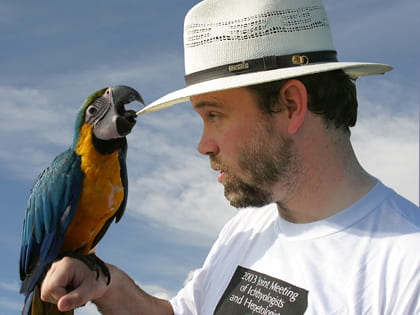In toon with biological sciences
Adam Summers revels in spreading fervor for his field

As the credits roll onto the screen after the Disney-Pixar movie “Finding Nemo,” up pops the nickname “Fabulous Fish Guy” that Pixar staff affectionately gave to their technical consultant Adam Summers.
It is an apt moniker for Summers, assistant professor of ecology and evolutionary biology in the School of Biological Sciences and an expert in the biomechanics of how fish move, breathe and eat prey. During three years of the film’s production, he made a big splash with story creators, artists and animators as he immersed them in what amounted to graduate-level ichthyology courses.
A UCI faculty member since 2001, Summers applies engineering principles to study the way animals function, with a special emphasis on the constraints and benefits of cartilage versus bone in fishes. Certain stingrays, for example, can exert 1,000 pounds of pressure to crush a clam in their cartilaginous jaws. With a $350,000 grant recently awarded by the National Science Foundation, Summers plans to uncover more fabulous fish facts as he researches the material properties of shark cartilage.
“Shark skeletons are made of cartilage that performs many more jobs than it does in most animals,” says Summers. “Understanding the biochemical makeup of cartilage will lead to knowledge of the diseases that affect animals, and help to answer some of the fundamental questions about the evolution of skeletons.”
Summers completed bachelor’s degrees in both math and engineering at Swarthmore College in Pennsylvania. He found his niche in fish during two years in Australia as a diving instructor off the Great Barrier Reef. But he also found that simply locating sea life for photographers and researchers was not enough. The experience ultimately directed his interest to the study of biology and a master’s degree at New York University, then a doctorate at the University of Massachusetts.
Now each day he revels in helping students answer new questions swimming around in their heads. “If you’re stuck, wait a few minutes and Adam will help you get unstuck,” says graduate student Justin Schaefer. “His interest in students and enthusiasm for science are amazing. He also has an annoyingly vast knowledge of just about everything.”
Evidence of that fact is revealed in the monthly column Summers writes for Natural History magazine, where he explores topics ranging from spider web silk strong enough to catch a bullet, to why the dinosaur T. rex couldn’t run fast. Along with his work on “Nemo,” these articles have allowed Summers to do another thing he’s good at – communicating to a popular audience the deep love and endless fascination he has for his field.